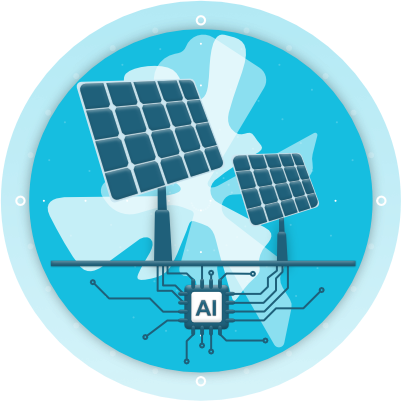FIELD: APPLIED MATHEMATICS
ARTIFICIAL INTELLIGENCE FOR POWER INDUSTRY APPLICATIONS
The new master's curriculum Artificial Intelligence for Power Industry Applications was developed by Ural Power Engineering Institute in 2021. Our target audience are bachelors and specialists in technical and natural sciences. Within the framework of the module Operation modes of distributed generation the students will be offered to solve an engineering case developed together with the RTSoft group of companies. The case will address the development of the control systems for distributed energy resources.
Fully taught in English
2 study years 120 ECTS
Full time mode of study
15 vacant places

YOU CAN HANDLE DATA
About the program
Future professional activities
Future professional activities of the graduates are related to: - using the methods of artificial intelligence for the tasks of the energy sector - technological data processing and analysis - development of mathematical models of technical systems and technological processes - development of decision support systems taking into account the cybersecurity issues
Core of the program
The program consists of three main parts: - traditional mathematical modules of discrete mathematics and optimization of technical systems - modules for data processing and analysis, programming in Python and cybersecurity - applied power industry tasks related to power generation technologies, power system operation modes analysis and optimization, new digital technologies in the energy sector The masters curriculum takes it's roots from the Erasmus+ ESSENCE project funded by the Erasmus+ Programme of the European Union, Key Action 2, Capacity Building in Higher Education.
Industrial partner
The program is implemented together with the RTSoft group of companies - an international engineering group of companies performing industrial automatization, software development in the sphere of intelligent control systems for the power industry and other industry branches. Within the framework of the module Operation modes of distributed generation the students will be offered to solve an engineering case developed together with the RTSoft group of companies. The case will address the development of the control systems for distributed energy resources.
Disciplines
The disciplines of the program address the basic principles of construction and design of intelligent information systems in the sphere of the power industry based on the real practical cases, reliable and safe application of data analysis, machine learning and digital technologies at the power industry facilities.
The discipline focuses on Python language programming. During the course, students learn the Python syntax, the features of the SciPy, NumPy, matplotLib, Pandas libraries, and some built-in libraries for solving power industry applied problems. The discipline forms an idea of how to present a mathematical problem as a program code. Students learn to represent and visualize data and experimental results.
The discipline addresses data representation in various machine learning problems. The discipline provides an overview of the fundamental data types: numerical tabular data, time series, images, textual data. Lectures cover the theoretical aspects of data analysis, including probability theory and mathematical statistics. As part of the laboratory sessions, case studies of various methods and approaches application are considered. In addition, the course provides an overview of the main tools for working with big data and cloud computing.
The discipline studies the main machine learning techniques and their application in the power industry. The following sections and machine learning techniques are considered: supervised learning in classification and regression problems (linear models, support vector machines, decision trees, Bayesian methods, k-nearest neighbors, neural networks, ensemble algorithms), unsupervised learning (clustering algorithms), reinforcement learning and optimization methods (genetic and swarm algorithms), fuzzy logic. Special focus is given to preliminary analysis and data processing approaches.
The discipline studies the basic principles of assuring data security and providing protection against cyber threats for power system facilities. The discipline covers legal and organizational issues, software specifics, technical and algorithmic methods of data protection used to assess the threats and to model the corresponding protection measures. Special consideration is given to the existing legal framework in the sphere of data protection and the relevant industrial standards. The discipline forms deep understanding of the types of data to be protected, the classification of cyber threats at power system facilities, various protection techniques, the principles of their operation and selection criteria. The project is implemented by the winner of the Master's Program Faculty Grant Competition of the Vladimir Potanin Fellowship Program.
The discipline studies the principles, methods and tools of studying complex objects by representing them as integrated systems. The purpose of studying the discipline is to consider the theoretical foundations and patterns of systems’ design and operation, including methodological principles of their analysis and synthesis. The studied approaches will be applied for critical analysis, interpretation and generalization of research results in the professional area and making strategic decisions.
The discipline is focused on IEC 61850 standard and other related technologies ensuring the performance of the digital power industry facilities. In particular, the course studies a general concept of the substation information model, a description of a specialized markup language for creating a substation model according to IEC 61850 standard. Case studies of digital substations considered in detail allow to gain skills in equipment setting up to implement a communication traffic between the digital substation’s units.
Meet our teachers
The teachers of the programs are the leading experts in the sphere of power and electrical engineering, thermal engineering, mathematics, informatics, cybernetics, economy, history and legal regulation.
Head of the Scientific laboratory of digital twins in the power industry Ural Power Engineering Institute, PhD
Head of program
Associate professor of the Electrical engineering department Ural Power Engineering Institute, PhD
Leading researcher of the of the of the Scientific laboratory of digital twins in the power industry Ural Power Engineering Institute, PhD
Professor of the Turbines and engines department UrFU, DSc